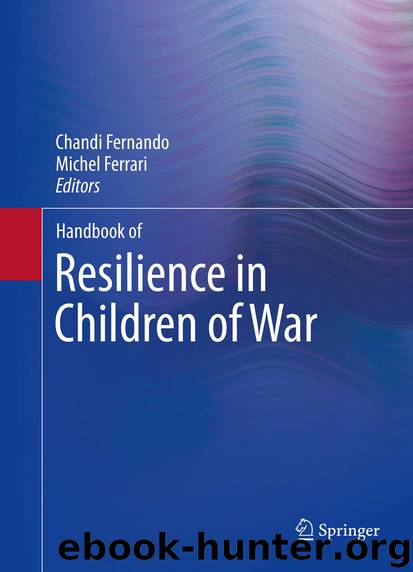Handbook of Resilience in Children of War by Chandi Fernando & Michel Ferrari

Author:Chandi Fernando & Michel Ferrari
Language: eng
Format: epub
Publisher: Springer New York, New York, NY
Meaning in Activity Systems
A first step toward this developmental approach is to zoom back from the figure of the individual child defined in terms of self-contained capacities that flourish or fail and to examine the broader system of relations among individuals, groups, and institutions. If political violence is not the activity of isolated individuals, then research on resilience should focus on relations among individuals and manifestations of violence. Extending the original ideas of cultural-historical theory (Vygotsky, 1964), scholars working in that tradition have proposed that activity systems are contexts for meaning and change: “Activity theory is an integrated approach to the human sciences that … takes the object-oriented, artifact mediated collective activity system as the unit of analysis, thus bridging the gulf between the individual subject and the societal structure” (Engestrom et al., 1999). This means that studying individuals—their lives, their understandings of their lives, and the connection of individual lives to one another—involves examining activities in social relations in real time where meaning is created. These interdependent meanings are embodied in the symbol systems people invent and use to organize life. Just as human civilization has progressed from using writing to count livestock to using writing for persuasive, aesthetic, and other purposes, young people master symbol systems to make sense of their environments and their roles in those environments, especially when those environments are unfamiliar.
An example of an activity-meaning system for research on the effects of violence is a political violence system (Daiute, 2010). The former Yugoslavia is an example of a developmental system because the generation was born in the country of Yugoslavia, experienced wars that broke it apart, and now live across numerous countries, with some oriented toward Western Europe, others eastward toward Mecca, and still others positioned between old alliances to Russia and the European Union (EU). Young people who began life in Yugoslavia were raised by parents educated and employed in that socialist system, then passed childhood during a war, and are now approaching adulthood in countries transitioning to capitalist democracies in very different ways. The tensions that matter to young people across these situations are far from obvious.
A developmental researcher can create a framework of the political violence system relevant to the circumstances of displacement (and other consequences of interest). This framework is created from historical review of events leading up to displacement of a specific group, and the subsequent spatial and temporal trajectories of the group. Data for such a framework include historical, archival, and ethnographic documents as a basis for the design of an empirical study of meaningful activities, most importantly, to elicit young people’s perspectives. The geopolitical system in my prior study was the former Yugoslavia, from creation in 1948 through 2007 when I collected data from the generation of young people who had grown up during and after the war (Daiute, 2010).
As shown in Fig. 11.1, a model includes the time, space, and activity dimensions relevant to displacement of this generation of youth. The relevant time periods of key political
Download
This site does not store any files on its server. We only index and link to content provided by other sites. Please contact the content providers to delete copyright contents if any and email us, we'll remove relevant links or contents immediately.
The Art of Coaching Workbook by Elena Aguilar(51136)
Trainspotting by Irvine Welsh(21608)
Twilight of the Idols With the Antichrist and Ecce Homo by Friedrich Nietzsche(18601)
Fangirl by Rainbow Rowell(9211)
Periodization Training for Sports by Tudor Bompa(8237)
Change Your Questions, Change Your Life by Marilee Adams(7717)
This Is How You Lose Her by Junot Diaz(6857)
Asking the Right Questions: A Guide to Critical Thinking by M. Neil Browne & Stuart M. Keeley(5740)
Grit by Angela Duckworth(5576)
Red Sparrow by Jason Matthews(5449)
Paper Towns by Green John(5163)
Room 212 by Kate Stewart(5091)
Ken Follett - World without end by Ken Follett(4705)
Housekeeping by Marilynne Robinson(4420)
The Sports Rules Book by Human Kinetics(4367)
Double Down (Diary of a Wimpy Kid Book 11) by Jeff Kinney(4252)
Papillon (English) by Henri Charrière(4238)
The Motorcycle Diaries by Ernesto Che Guevara(4069)
Exercise Technique Manual for Resistance Training by National Strength & Conditioning Association(4048)
